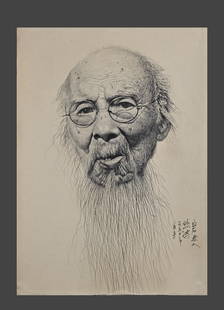
[Ancient Lawyers, Harangues] Demosthenes, 1744
Similar Sale History
View More Items in Books, Magazines & PapersRelated Books, Magazines & Papers
More Items in Books, Magazines & Papers
View MoreRecommended Collectibles
View More



![[Ancient Lawyers, Harangues] Demosthenes, 1744](https://p1.liveauctioneers.com/2198/56201/32339130_1_x.jpg?quality=1&version=1418320780&width=486)
![[Ancient Lawyers, Harangues] Demosthenes, 1744](https://p1.liveauctioneers.com/2198/56201/32339130_1_x.jpg?quality=80&version=1418320780)
Item Details
Description
DEMOSTHENES’ HARANGUES: THE ACME OF THE ART OF PERSUASION
THE FRANCESCO GUASTAVILLANI COPY
ONLLY TWO COPIES IN USA
DEMOSTHENES. Le Filippiche di Demostene illustrate con Osservazioni, e Prefazione Istorica a S. E. il signor Francesco Grimani senatore amplissimo [...]. In Venezia, appresso Pietro Bassaglia, MDCCXLIV [Venice: Pietro Bassaglia, 1744].
A thick volume in-8vo (155x90 mm), contemporary stiff vellum, six raised bands with handwritten title at spine, sprinkled red edges pp. [32], 140, 485, [1, blank].
TWO ENGRAVINGS IN RED, THE FIRST ONE AT FRONTISPIECE, REPRESENTING THE COATS OF ARMS OF THE NOBLE VENETIAN FAMILY GRIMANI, AND THE OTHER ONE AT TITLE-PAGE WITH THE PRINTER’S DEVICE.
FINE VENETIAN EDITION OF DEMOSTHENES HARANGUES AGAINST PHILIP II OF MACEDON, THE ACME OF ANCIENT ART OF PERSUASION AND A SOURCE OF INSPIRATION FOR THE AUTHORS OF THE «FEDERALIST PAPERS» OF THE UNITED STATES CONSTITUTION.
This edition has a long historical preface about the History of Macedon.
DEMOSTHENES (384–322 BC), was a prominent Greek statesman and orator of ancient Athens. His orations constitute a significant expression of contemporary Athenian intellectual prowess and provide an insight into the politics and culture of ancient Greece during the 4th century BC.. He delivered his first judicial speeches at the age of 20, in which he argued effectively to gain from his guardians what was left of his inheritance. For a time, Demosthenes made his living as a professional speech-writer (logographer) and a lawyer, writing speeches for use in private legal suits.
He went on to devote his most productive years to opposing Macedon’s expansion. He idealized his city and strove throughout his life to restore Athens’ supremacy and motivate his compatriots against Philip II of Macedon. He sought to preserve his city’s freedom and to establish an alliance against Macedon, in an unsuccessful attempt to impede Philip’s plans to expand his influence southwards by conquering all the Greek states. After Philip’s death, Demosthenes played a leading part in his city’s uprising against the new King of Macedon, Alexander the Great. However, his efforts failed and the revolt was met with a harsh Macedonian reaction. To prevent a similar revolt against his own rule, Alexander’s successor in this region, Antipater, sent his men to track Demosthenes down. Demosthenes took his own life, in order to avoid being arrested by Archias, Antipater’s confidant.
The Alexandrian Canon compiled by Aristophanes of Byzantium and Aristarchus of Samothrace recognized Demosthenes as one of the ten greatest Attic orators and logographers. According to Longinus, Demosthenes «perfected to the utmost the tone of lofty speech, living passions, copiousness, readiness, speed». Cicero acclaimed him as «the perfect orator» who lacked nothing, and Quintilian extolled him as lex orandi («the standard of oratory») and that inter omnes unus excellat («he stands alone among all the orators»).
Sixty-one of Demosthenes’orations, fifty-six prologues and six letters survived till the present day.
Demosthenes’ fame continued down the ages. The scholars at the Library of Alexandria carefully edited the manuscripts of his speeches, and Roman schoolboys studied his art as part of their own oratorical training. During the Middle Ages and Renaissance, Demosthenes had a reputation for eloquence and he was read more than any other ancient orator. John Jewel, Bishop of Salisbury, and Jacques Amyot, a French Renaissance writer and translator, regard Demosthenes as a great or even the «supreme» orator.
In modern history, orators such as HENRY CLAY would mimic Demosthenes’ technique. His ideas and principles survived, influencing prominent politicians and movements of our times. Hence, he constituted a source of inspiration for the authors of the Federalist Papers (series of 85 articles arguing for the ratification of the United States Constitution) and for the major orators of the French Revolution. French Prime Minister Georges Clemenceau was among those who idealized Demosthenes and wrote a book about him. For his part, Friedrich Nietzsche often composed his sentences according to the paradigms of Demosthenes, whose style he admired. During World War II, the fighters of the French Resistance identified themselves with Demosthenes, and Adolf Hitler with Philip.
Advertising executive David Ogilvy frequently cited Demosthenes as a model for creating persuasive advertising, saying, «When Aeschines spoke, they said, ‘How well he speaks.’ But when Demosthenes spoke, they said, ‘Let us march against Philip’».
The Demosthenian Literary Society at The University of Georgia is named after Demosthenes, as a tribute to his oratorical ability and the manner in which he improved his speaking ability.
PROVENANCE: The Francesco Guastavillani copy, his inscription at first fly-leaf: Ex libris mei Francisci de Guastavillanis Anno Domini 1750. francesco Guastavillani was a senator and lawyer of Bologna, who obtained the first chair of Municipal Law at the University of Bologna, the oldest university of Europe.
REFERENCES: ICCU, VIAE\018618 (only five copies) C. ANTHON, A Classical Dictionary: containing the principle proper names mentioned in Ancient Authors, Kessinger 2005, vol. 1, p. 55: «One of the best edition of Aeschines is that of Wolf containing also the orations of Demosthenes. It was first printed at Basle by Oporinus, [...] at Venice in 1550». OCLC 29639924 locates ONLY TWO COPIES USA (College of the Holy Cross Dinand LIbrary, Worcester MA and Berkeley)
THE FRANCESCO GUASTAVILLANI COPY
ONLLY TWO COPIES IN USA
DEMOSTHENES. Le Filippiche di Demostene illustrate con Osservazioni, e Prefazione Istorica a S. E. il signor Francesco Grimani senatore amplissimo [...]. In Venezia, appresso Pietro Bassaglia, MDCCXLIV [Venice: Pietro Bassaglia, 1744].
A thick volume in-8vo (155x90 mm), contemporary stiff vellum, six raised bands with handwritten title at spine, sprinkled red edges pp. [32], 140, 485, [1, blank].
TWO ENGRAVINGS IN RED, THE FIRST ONE AT FRONTISPIECE, REPRESENTING THE COATS OF ARMS OF THE NOBLE VENETIAN FAMILY GRIMANI, AND THE OTHER ONE AT TITLE-PAGE WITH THE PRINTER’S DEVICE.
FINE VENETIAN EDITION OF DEMOSTHENES HARANGUES AGAINST PHILIP II OF MACEDON, THE ACME OF ANCIENT ART OF PERSUASION AND A SOURCE OF INSPIRATION FOR THE AUTHORS OF THE «FEDERALIST PAPERS» OF THE UNITED STATES CONSTITUTION.
This edition has a long historical preface about the History of Macedon.
DEMOSTHENES (384–322 BC), was a prominent Greek statesman and orator of ancient Athens. His orations constitute a significant expression of contemporary Athenian intellectual prowess and provide an insight into the politics and culture of ancient Greece during the 4th century BC.. He delivered his first judicial speeches at the age of 20, in which he argued effectively to gain from his guardians what was left of his inheritance. For a time, Demosthenes made his living as a professional speech-writer (logographer) and a lawyer, writing speeches for use in private legal suits.
He went on to devote his most productive years to opposing Macedon’s expansion. He idealized his city and strove throughout his life to restore Athens’ supremacy and motivate his compatriots against Philip II of Macedon. He sought to preserve his city’s freedom and to establish an alliance against Macedon, in an unsuccessful attempt to impede Philip’s plans to expand his influence southwards by conquering all the Greek states. After Philip’s death, Demosthenes played a leading part in his city’s uprising against the new King of Macedon, Alexander the Great. However, his efforts failed and the revolt was met with a harsh Macedonian reaction. To prevent a similar revolt against his own rule, Alexander’s successor in this region, Antipater, sent his men to track Demosthenes down. Demosthenes took his own life, in order to avoid being arrested by Archias, Antipater’s confidant.
The Alexandrian Canon compiled by Aristophanes of Byzantium and Aristarchus of Samothrace recognized Demosthenes as one of the ten greatest Attic orators and logographers. According to Longinus, Demosthenes «perfected to the utmost the tone of lofty speech, living passions, copiousness, readiness, speed». Cicero acclaimed him as «the perfect orator» who lacked nothing, and Quintilian extolled him as lex orandi («the standard of oratory») and that inter omnes unus excellat («he stands alone among all the orators»).
Sixty-one of Demosthenes’orations, fifty-six prologues and six letters survived till the present day.
Demosthenes’ fame continued down the ages. The scholars at the Library of Alexandria carefully edited the manuscripts of his speeches, and Roman schoolboys studied his art as part of their own oratorical training. During the Middle Ages and Renaissance, Demosthenes had a reputation for eloquence and he was read more than any other ancient orator. John Jewel, Bishop of Salisbury, and Jacques Amyot, a French Renaissance writer and translator, regard Demosthenes as a great or even the «supreme» orator.
In modern history, orators such as HENRY CLAY would mimic Demosthenes’ technique. His ideas and principles survived, influencing prominent politicians and movements of our times. Hence, he constituted a source of inspiration for the authors of the Federalist Papers (series of 85 articles arguing for the ratification of the United States Constitution) and for the major orators of the French Revolution. French Prime Minister Georges Clemenceau was among those who idealized Demosthenes and wrote a book about him. For his part, Friedrich Nietzsche often composed his sentences according to the paradigms of Demosthenes, whose style he admired. During World War II, the fighters of the French Resistance identified themselves with Demosthenes, and Adolf Hitler with Philip.
Advertising executive David Ogilvy frequently cited Demosthenes as a model for creating persuasive advertising, saying, «When Aeschines spoke, they said, ‘How well he speaks.’ But when Demosthenes spoke, they said, ‘Let us march against Philip’».
The Demosthenian Literary Society at The University of Georgia is named after Demosthenes, as a tribute to his oratorical ability and the manner in which he improved his speaking ability.
PROVENANCE: The Francesco Guastavillani copy, his inscription at first fly-leaf: Ex libris mei Francisci de Guastavillanis Anno Domini 1750. francesco Guastavillani was a senator and lawyer of Bologna, who obtained the first chair of Municipal Law at the University of Bologna, the oldest university of Europe.
REFERENCES: ICCU, VIAE\018618 (only five copies) C. ANTHON, A Classical Dictionary: containing the principle proper names mentioned in Ancient Authors, Kessinger 2005, vol. 1, p. 55: «One of the best edition of Aeschines is that of Wolf containing also the orations of Demosthenes. It was first printed at Basle by Oporinus, [...] at Venice in 1550». OCLC 29639924 locates ONLY TWO COPIES USA (College of the Holy Cross Dinand LIbrary, Worcester MA and Berkeley)
Condition
Very light traces of foxing, but a very fine copy.
Buyer's Premium
- 18% up to €10,000.00
- 16% up to €100,000.00
- 13% above €100,000.00
[Ancient Lawyers, Harangues] Demosthenes, 1744
Estimate €300 - €400
1 bidder is watching this item.
Get approved to bid.
Shipping & Pickup Options
Item located in Verona, itSee Policy for Shipping
Payment

Related Searches
TOP
















![[Harangues, Ancient Lawyers] Demosthenes, Aldus, 1551: DEMOSTHENES TRANSLATED BY THE YOUNG ALDUS’ SON DEMOSTHENES. Demosthenis Orationes Quatuor contra Philippum, A Paulo Manutio latinitate donatae. Venetiis, Apud Aldi Filios, 1551 [Venice: Sons of Aldu](https://p1.liveauctioneers.com/2198/81459/42269235_1_x.jpg?height=310&quality=70&version=1448567789)
![[Harangues, Ancient Lawyers] Cicero, 1519 3 vols: VERY RARE FIRST ALDINE EDITION OF CICERO’S HARANGUES [Cicero’s Harangues, Aldine] Cicero, Marcus Tullius. M. T. Ciceronis Orationum volumen primum [secundum et tertium]. Venice: Aldus Manutius, Ja](https://p1.liveauctioneers.com/2198/81459/42269203_1_x.jpg?height=310&quality=70&version=1448567789)
![[Harangues, Greek] Demosthenes 1554, 3 vols: FIRST AND ONLY ALDINE EDITION OF DEMOSTHENES’ ORATION IN THE ORIGINAL GREEK TEXT DEMOSTHENES. Demosthenis Orationum pars prima: in qua deliberativae sexdecim eius orationes, una cum exordiis deliber](https://p1.liveauctioneers.com/2198/81459/42269236_1_x.jpg?height=310&quality=70&version=1448567789)




























































